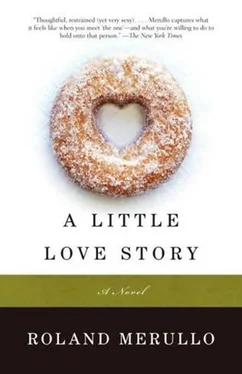Gerard was a past master at dimpling. That Election Day morning-it was sunny and nice, low fifties-I heard him in what would be Jacqueline’s guest bedroom giving her a lecture on Sheetrock. “The Greeks discovered gypsum, you know,” he said. “Gypsos , they called it. In America, factories started mass-producing this stuff right around World War Two, which put a lot of plasterers out of business. My dad was a plasterer. He went to school at night to become an environmental engineer, but then he became a barber. He was one of the first unisex barbers in Greater Boston. He actually invented the disposable razor for women, but had the patent stolen from him by a big corporation I won’t name.”
“Really?” Jacqueline said. She was too savvy to be buying much of it, but she liked him anyway, liked us both. From what she’d told us, there weren’t that many laughs to be had in the hallways of the Harvard Physics Department. Sometimes when Gerard would be thirty feet up on a ladder reciting Ovid, or we would be bored with nailing subfloor and were going back and forth with lines from movies (“Chollie! Chollie! They took my thumb, Chollie!”), I’d look over my shoulder and catch her watching us, and she’d smile and turn away.
My friend Gerard could be a goofy soul. But he was a good carpenter, one of the truly superb dimplers of all time, a natural teacher, too. I listened to him trying to persuade Jacqueline to take his hammer in her hand.
“I’ll ruin something,” I heard her say.
“What could you possibly ruin? Here, try it where the baseboard will go. That way if you make a little mistake you’ll never see it. Go ahead. Dimple away.”
At lunch, after Jacqueline had gone off to work and Gerard had calmed down a bit, I asked him if he was going to vote for Governor Valvoline, who had been good enough to keep Janet on the payroll after her boyfriend went gorilla, and decent enough to cease and desist from saying he loved her at close range. In the weeks leading up to the election she had been working twelve-hour days.
“Not,” Gerard said, “in two million years.”
“Who then? Captain Privatize?”
“Privatize your aunt,” he said.
“Who then?”
“Nader. I want to send a message to the big multilingual corporations.”
“Nader’s not on the ballot.”
“Sure he is. You hit the button for Buchanan, Patrick J., and it counts for Nader. Everybody knows that.”
“Buchanan’s not on the ballot either,” I said. “It’s Valvoline, Captain Privatize, or the Libertarians.”
“The Librarians, then. I’m bookish on libraries.”
“Be serious a minute,” I said.
“Alright. Valvoline is the boss of the love of your life, correct?”
“Correct.”
“But there’s just something about him we don’t like, am I right?”
“Right.”
“We don’t know exactly what it is, but he’s, you know, kind of a mook. And we don’t vote for mooks even if good people work for them. Alright, Captain Privatize is as rich as an Arabian prince and wants to bust unions and strap the bad guys down and jolt them. The Librarians want the government to leave everyone alone, rely on people’s natural good-heartedness, and hope everything works out. Where does that leave us?”
“Up the well-known creek.”
“Exactly.”
“But not voting is un-American.”
“Precisely,” he said. “Which is why yours truly is going hanging chad.”
“It’s a kind of dimple.”
“Dimple gone wrong.”
I took a sip of root beer and watched an ambulance go past, lights blinking, siren off.
Gerard said, “I’m glad we had this talk,” and stood up to go back to work.
I WAITED IN LINE at the polling place in my work clothes-boots, jeans, and an old Boston University Varsity Rowing sweatshirt with gypsum dust on it.
I get sentimental when I go to vote. My precinct includes a neighborhood that’s mixed in every direction: white lesbians in business suits, Honduran maids just finished with a day’s work at the hotel, Russian Jews who remember Stalin’s voice on the radio, black ironworkers with their AB hardhats in one hand, Waspy white guys with gypsum dust in their hair. Looking at an improbable mixture like that when I’m in line to do my democratic duty, I think: There’s no country on earth anywhere near this good. And then, later, that it is a great country, and we have welcomed people from everywhere on earth, but that we somehow never really live up to our own grand rhetoric; that if we were half what we claimed to be, we’d long ago have cured every illness on the planet, and wouldn’t have hungry kids in Kansas or the Bronx, and a million or two million people in prison. And so on. I think about the whole mad, spiritless rush we call the working week. I sink and sink.
In the end, that day, after wandering the moral maze for five or six minutes in the little booth, and feeling the usual election-day depression creeping up my leg, I cast my vote for the Idealist Party candidate, a write-in ballot: Rossi, Janet, S. And then I went home to get ready for the victory bash.
THE ELECTION-NIGHT party for Charles S. Valvelsais, a.k.a Charlie Valvoline, was held at the third most expensive hotel in Boston, a twenty-two-story palace with a lobby so heavy on mirrors, brass, and oriental carpet that you felt as though you were in an Ashkabad hookah joint where the lights had accidentally been turned on. Janet had been asked to help make some of the arrangements-a kind of demotion for her, Valvoline’s idea of payback-and as I walked down the carpeted corridor toward the noise of the ballroom, I couldn’t keep a bad thought from attaching itself to me. It was a thought I’d had before, and it went something along these lines: Janet had compromised herself and I had not.
Hoping to change the world, she’d aligned herself with a man who was mixed-up inside, decayed, corrupt, false, whereas I hadn’t aligned myself with anyone and had stayed pure. I knew this kind of thinking was distilled bullshit, 180 proof, and I knew it came from the bad soil of a feeling that I hadn’t done as much with my life as I could have-I’d been given a good brain, a good education, a healthy body, and hadn’t helped anyone who really needed help, hadn’t given much back to the world besides a few dozen well-built additions scattered around Greater Boston, two small houses, eight garages, a hundred little repair jobs. I’d started medical school with the intention of doing what my mother had done-spending a life making sick people feel better-and then I’d somehow gotten tired of cramming scientific facts into my brain. I’d made an invisible turn, inward, thinking I’d be better off healing myself first, before I went after anyone else. Some days that seemed like a good decision, important, humble, mature; other days it seemed like escape. I had a room full of paintings, a short string of failed romances, no wife, no prospects for children. And in a certain kind of light, all that could take on the mean glint of failure, and that failure could make me start to tear down people who had done something more valuable. In that light, even Chuck Valvoline had led a more useful life, and I wondered if Janet ever compared us that way, if she had bad little thoughts about me that stuck to her, if those were the kinds of thoughts that ate away at the tissue of love, year by year, until you went looking for a replacement.
But once I turned into the noisy ballroom-a happy, comical scene-it wasn’t too hard to shake those thoughts. The interior world, the world of art and musing, the world of working with your hands-those places had their value. And I was more or less satisfied with the man I had become, stupidities and all. On that night, I was almost at peace.
Читать дальше












